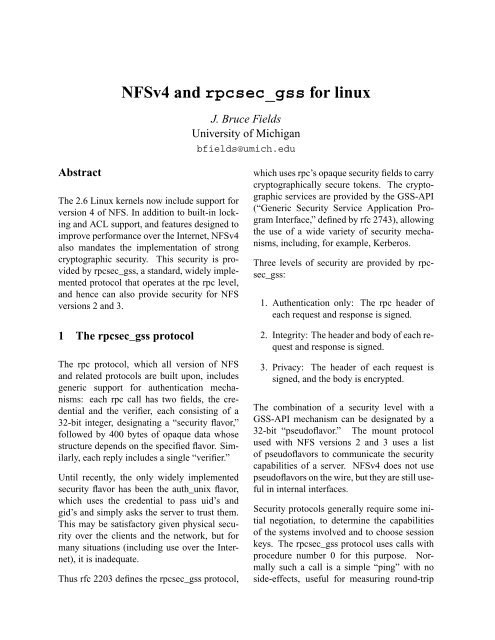Create successful ePaper yourself
Turn your PDF publications into a flip-book with our unique Google optimized e-Paper software.
NFSv4 and rpcsec_gss for linux<br />
J. Bruce Fields<br />
University of Michigan<br />
bfields@umich.edu<br />
Abstract<br />
<strong>The</strong> 2.6 <strong>Linux</strong> kernels now include support for<br />
version 4 of NFS. In addition to built-in locking<br />
and ACL support, and features designed to<br />
improve performance over the Internet, NFSv4<br />
also mandates the implementation of strong<br />
cryptographic security. This security is provided<br />
by rpcsec_gss, a standard, widely implemented<br />
protocol that operates at the rpc level,<br />
and hence can also provide security for NFS<br />
versions 2 and 3.<br />
1 <strong>The</strong> rpcsec_gss protocol<br />
<strong>The</strong> rpc protocol, which all version of NFS<br />
and related protocols are built upon, includes<br />
generic support for authentication mechanisms:<br />
each rpc call has two fields, the credential<br />
and the verifier, each consisting of a<br />
32-bit integer, designating a “security flavor,”<br />
followed by 400 bytes of opaque data whose<br />
structure depends on the specified flavor. Similarly,<br />
each reply includes a single “verifier.”<br />
Until recently, the only widely implemented<br />
security flavor has been the auth_unix flavor,<br />
which uses the credential to pass uid’s and<br />
gid’s and simply asks the server to trust them.<br />
This may be satisfactory given physical security<br />
over the clients and the network, but for<br />
many situations (including use over the Internet),<br />
it is inadequate.<br />
Thus rfc 2203 defines the rpcsec_gss protocol,<br />
which uses rpc’s opaque security fields to carry<br />
cryptographically secure tokens. <strong>The</strong> cryptographic<br />
services are provided by the GSS-API<br />
(“Generic Security Service Application Program<br />
Interface,” defined by rfc 2743), allowing<br />
the use of a wide variety of security mechanisms,<br />
including, for example, Kerberos.<br />
Three levels of security are provided by rpcsec_gss:<br />
1. Authentication only: <strong>The</strong> rpc header of<br />
each request and response is signed.<br />
2. Integrity: <strong>The</strong> header and body of each request<br />
and response is signed.<br />
3. Privacy: <strong>The</strong> header of each request is<br />
signed, and the body is encrypted.<br />
<strong>The</strong> combination of a security level with a<br />
GSS-API mechanism can be designated by a<br />
32-bit “pseudoflavor.” <strong>The</strong> mount protocol<br />
used with NFS versions 2 and 3 uses a list<br />
of pseudoflavors to communicate the security<br />
capabilities of a server. NFSv4 does not use<br />
pseudoflavors on the wire, but they are still useful<br />
in internal interfaces.<br />
Security protocols generally require some initial<br />
negotiation, to determine the capabilities<br />
of the systems involved and to choose session<br />
keys. <strong>The</strong> rpcsec_gss protocol uses calls with<br />
procedure number 0 for this purpose. Normally<br />
such a call is a simple “ping” with no<br />
side-effects, useful for measuring round-trip

















